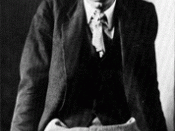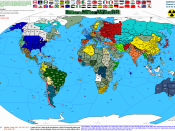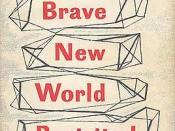Human corruption often breeds negligible outcome. Few models reveal this better than Aldous Huxley's literary revelation of a Brave New World where technology and the allowance of vice supersede human concerns. The novel startlingly begins in the year 632 a.f. (after Ford), and slowly a world where the human race trades in perpetual bondage for base pleasures takes shape. However, within this world where government operation is the only operation, emerges John the Savage, the lone hope of humanity against the seemingly impregnable influence of the World State in power. The Savage foils every small aspect of the enthralled world; he serves as the unadulterated missing link for the human race to discover its shortfalls and overcome its own vice in order to oppose the World State, which conditions humans into servitude with the offering of giving into desires. The Savage, a rugged man with a small ruffian band battling the world superpower, offers glimpses of the potential of humanity to overcome its bondage, but the overwhelming resistance to reforming their lifestyles and utilizing free will, all essential qualities in separating mankind from beast, reveals that human desire more than anything else holds the potential to flood the world in servitude.
As the society of the brave new world proves, the allotment of human vice without repercussion overpowers benign moral values.
The lack of humanity and any semblance of emotion exploits a society's brute apathy for the past world where pleasure had to be earned. Huxley's objective narration creates an overwhelmingly cold and emotionless society. Frederik Pohl remarks on this choice, and, analyzing the psychology of the novel, declares the "familiarity breeds numbness" (348). Huxley avoids the practically-expected convention that a novel pack a huge deal of emotion, and by challenging this convention, Huxley keeps the reader fully attuned...


